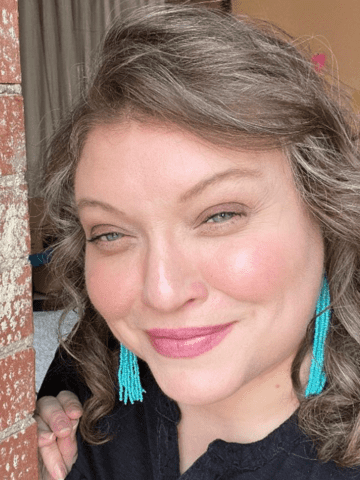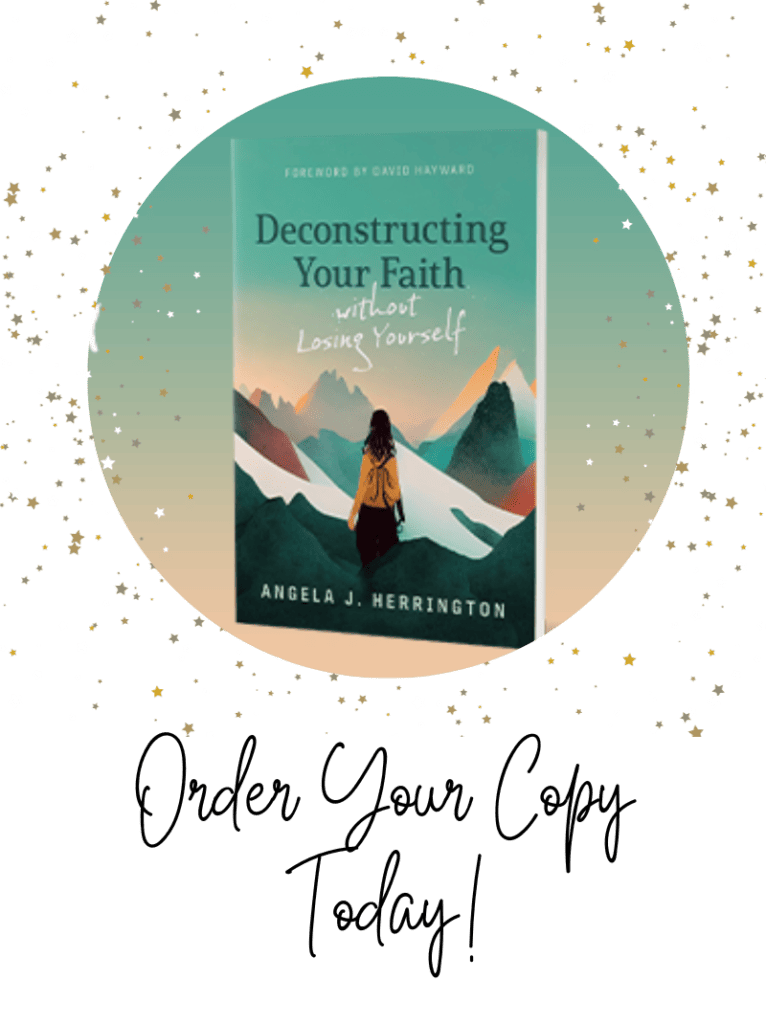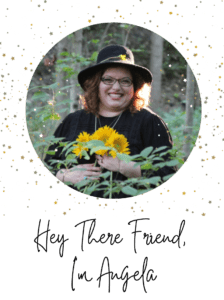Women in the church are constantly facing toxic religious culture and trauma.
Patriarchal teaching and abusive leadership create a toxic environment where women question their value, voice, and beliefs. Even though trauma changes our lives, it’s possible to grow through it and not let it keep us stuck.
It’s possible to address the internal chaos, set external boundaries, and step away from unhealthy churches. It’s possible, and necessary, to deconstruct your faith to root out the patriarchal teachings that have been pushed on you. It’s the first step to freedom and peace.
But the deconstruction process is messy, and healing religious trauma surfaces a lot of emotions. As I’ve worked with clients through church hurt, they’re often surprised that they still have a ton of emotional baggage to sort through, even after they’ve started deconstructing their beliefs and stepped away from toxic cultures. They wonder, “Why do I feel so bad? I’ve made such great progress! Why on earth am I so cranky? Why does my heart hurt so bad?”
Although religious trauma has been dealt with and there is newfound stability, life does not always automatically seem better.
I know so many women that are strong, amazingly resilient, and adaptable. They have made it through some hard stuff. But now on the other side of that hard stuff it feels like there is still some chaos.
If you have gone, or are currently going, through this, I want you to know that this is totally normal. In fact, I would be more concerned if you weren’t experiencing this!
You’ve been in crisis mode for months–most likely years. You’re finally on the other side of that toxic religious culture, which means you’re now starting to come out of what I affectionately call bear mode. Bear mode is a term my family and I use that basically means you’re on high alert all the time. You’re waiting for something to come around the corner, and you’re constantly in a state of fight, flight, or freeze. Except now that you’ve worked through your religious trauma and are in a new mode of living, you know you’re safe, and your body is trying to reset.
So as you release yourself from the fight, flight, or freeze mode, you’re starting to become aware of all of the things you haven’t dealt with.
When you’re in “bear mode” and there’s an emergency, your brain isn’t worried about relationships, self regulation, or the day-to-day stuff of life. Your brain is on alert for more potential trauma.
For so long, all your brain has been worried about it is getting away from the bear and being ready to run when the bear attacks. Now your brain is convinced there is no bear. So your high alert is dropping to medium alert, maybe even to low alert, and your body is resetting. Now all of the emotions, the self regulation, and all of the less urgent stuff that couldn’t be dealt with in bear mode is coming to the surface. Because it can. And it should. This is part of the healing process. It’s part of the way that your body keeps you safe.
Have you ever watched one of those shows about hoarders?
This process reminds me of the parts of these shows where you go into the kitchen, but it’s not just kitchen stuff in there. There’s bathroom stuff, bedroom stuff, trash, and all these different things piled up into one space.
The unrest welling up inside of you after coming out of religious trauma is like walking into your emotional kitchen. But instead of there just being food, cabinets, and an easy way to go in and care for yourself, you’ve got all of these extra emotions that have been building up while you were in trauma. The only way through it is to pick up each emotion one by one. And then decide what you want to do with it.
Hoarder shows usually feature several piles: keep, donate, trash, and revisit pile. They try to keep it as simple as possible. I have my own personal emotional sorting system that I think is pretty simple. It may help you sort through the emotional baggage that’s left after you come out of a traumatic season. I’ve used this myself many times, and my family and clients use it as well. Here are 3 simple categories you can use to sort through your post-traumatic emotional baggage.
What needs to be felt?
The first thing I want you to do is allow each of your emotions to be felt. No emotion is off-limits, as they all provide helpful and necessary information to you. And that means accessing the full range of your emotions, including anger, sadness, and frustration.
Anger: There are things you didn’t do because you were discouraged by patriarchal church leadership. Things that have a cost that you paid for during a certain trauma. There may be physical signs and symptoms. Perhaps there are emotional costs. You may have even faced direct abuse from leadership or family members, only to have the church defend the abuser. Your anger is valid, and needs to be felt for you to heal.
Sadness: There are things that you can’t go back and re-create. Career, personal, and family decisions that were negatively influenced by unbiblical, toxic teaching. Relationships that were once dear to you that have been severed because the other person wouldn’t support your deconstruction. Things you can’t get back need to be grieved. Let yourself feel the hurt, recognize the loss, and accept those things you cannot change.
Frustration: You might have many experiences where your voice was not heard and valued by the people who were supposed to be shepherding you. There might be incidents where your leadership was ignored, opposed, or dismissed outright due to your gender. You may have felt obligated to accept “teaching” from people who clearly didn’t know their stuff, and who heaped additional pain onto you in the process. That frustration is not too small to notice and work through.
Recognizing and allowing yourself to feel all of the things will help bring closure to that season and allow you to move forward.
What needs to be redeemed?
The second category of baggage I want you to identify is things that need redemption and restoration. Perhaps when you were younger, before your religious trauma, you laughed and were full of joy. Maybe you were creative loved artistic outlets like poetry or painting or building. Perhaps you were courageous and completely willing to speak up against injustice. Maybe you were a lover of reading and you used to sit and read for hours. You may have been a more confident or a more peaceful person before your trauma. Those are things that can be redeemed with God’s help. You can find those things again. They may have been buried by all of the trauma, but they’re still there.
What needs to be revisited at a later time?
In addition to determining what needs to be felt and what needs to be redeemed, I want you to create a third bucket for things that are really messy and complicated. Things that you’re not quite sure what bucket they belong in yet. We’re going to call this the “come back later bucket” or the “parking lot bucket”.
I want to be VERY clear on one thing: this does not mean stuffing or avoiding your emotions. This bucket is not a means of avoiding pain or procrastinating because it’s hard. You can do hard things. This bucket is useful if you have things that are so big and messy and you just don’t know what to do with them yet. But continue doing your healing work. Get professional help from counselors or coaches that specialize in this process. Clear your plate a little, even if it means dropping some commitments, so that you have the mental and emotional bandwidth to process. And continue feeling and redeeming, and you may gain clarity on some of these messier items. Because it’s all interconnected, and you’re a holistic person.
In seasons where life is a little more peaceful, take time to recognize that all these emotions coming to the surface are just things that you’ve been carrying around for a long time, and it’s time to start sifting through them.
This is a fantastic time for you to get a life coach, a spiritual director, or a therapist. To spend some time with people who will hold you accountable, and to identify your chosen family. Find people who are on the other side of their religious trauma who recognize that this is part of a healthy journey.
If you’re looking for support and guidance as you heal from religious trauma and deconstruct your faith, please reach out! I offer individual coaching for women looking for a sacred space to explore God without the oppression of patriarchy and toxic religious culture. You can request a free consult here!




Angela is a Faith Deconstruction Coach and host of The Deconstructing Faith Summit who helps people break free from toxic religious culture & empowers them to recover from #churchhurt. She has led online ministries for a decade, enjoys working with clients 1:1, in groups, and is a dynamic conference speaker. She’s a Lark’s Song Certified Life Coach who reaches thousands of people in 40+ countries each month on Facebook, IG, Twitter, Pinterest, and her blog.
She’s a firstborn, Enneagram 8, Gen Xer who loves to question everything. She holds a BA from Indiana Wesleyan and a Masters in Leadership from Wesley Seminary. Her graduate research project focused on leadership development and opportunities for Gen X women in the US church.
Angela and her unique online ministry are featured in Lyz Lenz’s 2019 book God Land: Story of Faith, Loss, and Renewal in Middle America. She has published articles in Hope for Women and HOPE is Now magazines. She has been featured in The New Republic, Publisher’s Today, and Religion News Service.
Her first book, Deconstructing Your Faith Without Losing Yourself, Will be published by Eerdmans in February 2023.
Angela is also a wife, mom to 5, and a proud resident of Marion, Indiana with her family when they’re not traveling the US in their RV.






Hello Angela! Thank you for your insights on working through an the emotional baggage with trauma. I have been introduced to a Prayer model called Heart 2 Heart Prayer. This prayer process is a conversation with Jesus where you receive His truth for all the lies. Jesus has so much to say to us and it’s a beautiful process. You can check it out at h2hprayer.com. Blessings!